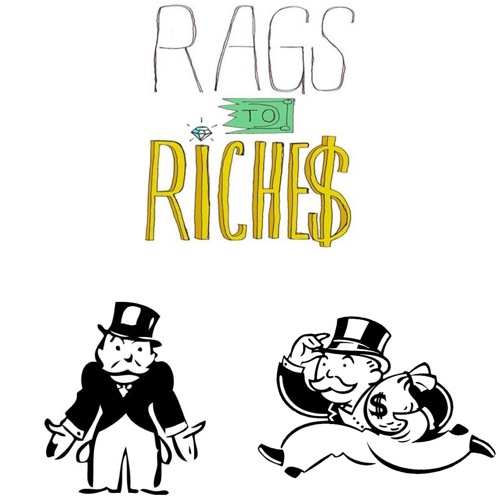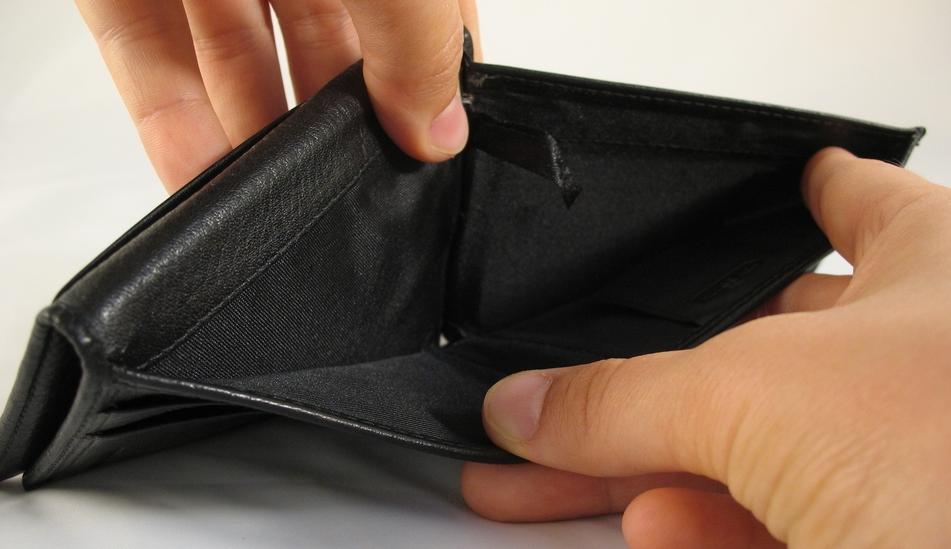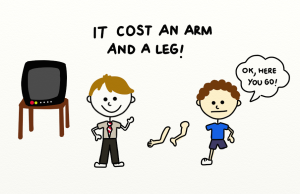It is irrefutable that money concerns us humans greatly. As a child, we wonder how to spend your little pocket money reasonably. Time flies, and when we grow up, we start to worry more about our future. What will we do? Will we make enough money to cater for ourselves and our parents? And after all, what is money? Regarding its appearance, money is just a coin or a note. However, money is also what everyone craves. It is a medium of exchange that helps us get hold of whatever we like. So, how can we earn a lot of money?
I know a way that is most likely to help solve your puzzles. Knowledge. Study is the shortest path to success. For this reason, add these 15 below idioms about money to your note to take a step closer to your dream.
1.Foot the bill:
Foot the bill means to pay for something, perhaps costs you a considerably large amount of money.
Example:
– Apparently, the married couple couldn’t foot the bill for their son’s college tuition fees.
– The two middle-aged men are arguing over who should foot the bill for the meal.

I guess you are more than willing to foot the bill for me, huh?
2. Not break the bank
Not break the bank is used to describe a situation when you have to pay for something that is beyond your ability. It costs so much that you may have to spend your very last penny.
Example:
- I’m sure that buying this car will not break the bank.
- You will not break the bank if you know how to organise your spending rationally.

Have you ever bought something that almost broke the bank?
3. Be in the black
If someone has money to spare, for instance, in his/her bank account or he/she is not in debt, he/she is in the black.
Example:
- Let’s eat out for this dinner. I am in the black now.
- They want to stay in the black as long as possible.
Now, contrary to the aforementioned phrase, when someone is in the red, he or she has spent more than he or she could earn, or they are facing financial problems.
Example:
- If our company keeps staying in the red next month, we will go bankrupt.

Are you currently in the black or in the red?
4. Money talks
Money talks is referred to as an expression when someone is trying to convey the power of money. In other words, you can do or get whatever you desire if you are rich and affluent.
Example:
- We all know for a fact that in this city, money talks.
- To some people, it is a piece of cake to be employed by a famous company, as money talks.
5. On the house
When someone gets something on the house, he or she does not have to pay for it.
Example:
- Make yourself at home. All the drinks are on the house.
- I got this fancy dress on the house in one of my friend ‘s stores.

Have you got anything on the house?
6. Penny pincher
This functions as a noun to depict a person who is constantly conscious of money, aware of the total sum that he/ she expended. He/ she tries his/ her best not to spend money on unnecessary things. A penny pincher can also be learned as someone with a frugal lifestyle.
Example:
- He used to be a penny pincher in the past, but now he is one of the wealthiest men in the USA.
- I tried not to take offence when people called me a penny pincher.

Being a penny pincher can be both beneficial and harmful
7. From rags to riches
You can understand the figurative sense by guessing its meaning literally. Rag is a piece of old cloth that is torn, worn out, and out of use. Meanwhile, rich can be explained as a valuable possession or a large amount of money.
Symbolically, from rags to riches is used to describe a change from being poor to rich.
Example:
- She worked so hard the past ten years and eventually went from rags to riches.
- MacMillan seems like a typical Wall Street figure, but in reality, his is a rags to riches story.

There are bunches of motivational stories of rags to riches
8. Earn a living
To earn a living is to make enough money to live on, to receive a fair wage to cater for your needs.
Example:
- He earns a living by selling souvenirs at some tourist attractions. Poor little boy!
- How can you earn a living if you are sacked? You should have never let this happen.

It is part of your life. Try hard!
9. Go bust
This idiom might be easily defined as to become bankrupt and lose all the fortune. To illustrate, if a company goes bust, it runs out of money and is no longer able to afford the bills. Hence, it is forced to close down.
Example:
- Had it not been for financial aid from your father, my company would have gone bust.
- I have never thought that his business would go bust.

Hope you will never have to experience this!
10. Nest egg
A nest egg, literally, is the place where animals lay their eggs and hatch them. However, in today’s money-related topic, a nest egg is learned as an amount of money, in most cases a large one, which is set aside for particular purposes or for the future generally. It can probably be for the cost of education, or retirement, etc.
Example:
- I was taught to put part of my pocket money into my nest egg in the bank account that my parents created for me.
- A nest egg is surely something you can fall back on, should unfortunate things crop up in the future.

Do you have you own nest egg? If not yet, you’d better get one.
11. Not have two pennies to rub together
Penny is the smallest unit in the USA currency. So by this way of saying, people want to express their extremely poor condition. When someone does not have two pennies to rub together, he or she has very little or no money to spare.
Example:
- I put all my money on gambling and lost. Now I do not have two pennies to rub together.
- With this pace of spending, it is very likely that we will not have two pennies to rub together at the end of the month.

You must have been in this difficult situation once!
12. Go dutch
To go dutch means to split the bill equally and evenly for the sake of fairness. When your friend says, “let’s go dutch”, he means “let me pay half of the price”.
Example:
- I am in the red these days, so shall we go dutch tonight?
- Some people always go dutch because they do not want to feel indebted to anybody.

Have you ever been told by a friend that you should go dutch?
13. Cost an arm and a leg
This might be familiar with you as it is often used in daily conversations. If something costs an arm and a leg, it is intensely expensive. Arm and leg are the main and indispensable parts of the human body. Thus, the expression is used to describe something lavish and rather incomprehensible.
Example:
- It costs me an arm and a leg to have these gorgeous shoes.
- This Lamborghini must cost an arm and a leg.

Have you ever purchased something that costs an arm and a leg?
14. Pay through the nose
While the above idiom is used to describe objects, pay through the nose is applied to people. It has the same meaning as cost an arm and a leg. You have to pay a great sum of money for something.
Example:
- They paid through the nose for that bracelet at the auction.
- I have to pay through the nose to a ticket to EXO’s concert in Korea.

15. Have money to burn
This phrase is exactly opposite to the sixth one – penny pincher. When you have money to burn, the amount of money you own is much larger than you need. So you spend it on inessential items. In this case, you burn your money without lighting a fire.
Example:
- She must have had money to burn when investing in that company.
- I do not know how much he earns each month, but he seems to have a lot of money to burn.

Never try this at home. You can give it to charity instead!
CONCLUSION
You have come to the end of our topic today. Congratulations! You did a great job. We hope you gained and widened your knowledge a bit more after every lesson. Don’t forget to write the above idioms about money down in your notebook and recall them regularly so that they will stay in your long-term memory.
We have a small tip to help memorise new vocabulary more effectively. While noting, you should not use my given examples. Try to make your own sentences and apply them to real-life conversations. It is okay if you forget the meaning every now and then. Learning to master a foreign language has never been an easy task. You need to be patient and studious. Take it slow, and someday you will find the unexpected!
Good luck to you all, and stay safe!
See you in other lessons.





